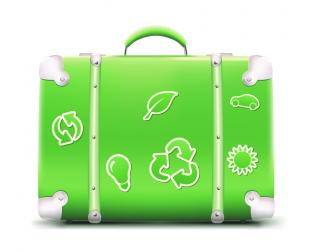
Travel boosts our carbon footprint but sometimes you just can’t get around that. The best you can do is try to minimize your impact and offset it where you can. To do this, it’s worth noting that travel isn’t just about how you get from A to B, though that’s the big one. For green living when you travel, it’s useful to take a good hard look at your lu ggage and accessories and make it as eco-friendly as possible.
For traveling you probably want something that’s tough, especially if you’re transporting anything fragile. Most luggage manufacturers use plenty of synthetic materials, because they’re tough and usually cheaper to make. Those materials are also usually made from petroleum based products, which means they use up non-renewable resources and can give off volatile compounds. They also take forever to degrade once you’re done with them, but you do have other choices.
Designers and manufacturers are aware of the problem and some have got it together to produce alternatives. You can find high quality hard case suitcases made from recycled plastic, as well as eco-friendly luggage made entirely from recycled raw materials. It’s not just the casing you’ll want to consider. It’s also interior webbing, straps and other finishing touches.
To avoid non-renewable materials altogether, there’s a natural material that’s environmentally friendly and strong enough for luggage. That material is hemp. As an industrial crop, hemp is eco-friendly because it isn’t a thirsty crop in terms of water needs, and it doesn’t require heavy treatment with pesticides and herbicides. Hemp fabric luggage will biodegrade easily when it comes to the end of its life. If you’re not in the market for new luggage, second-hand is something to think about, while vintage luggage can be a stylish green alternative.
Another way to offset the impact of travel is to use a smaller suitcase and pack intelligently. The cliché is that women take everything but the kitchen sink on vacation, but it’s actually a trap anyone can fall into. Just because you can take x pounds of luggage on a plane doesn’t mean you have to get your money’s worth. If the airlines reduced the limit they’d be saving massive sums on fuel. More importantly, it would make a difference to carbon emissions. You’ll use less gas in a car with an emptier trunk too.
You can do your bit by not over-packing. For vacations in exotic places, research the weather and resist the need to pack outfits for all possible climatic eventualities, or to avoid having to wash stuff on holiday. For more temperate destinations, layering your clothes can obviate the need for heavy coats and sweaters. If the worst actually happens, you could probably buy something where you’re going. Traveling light is less effort and less of a problem (though still not funny) if your luggage gets lost. Finally, if you have to fly or drive, you can still stick to your green living standards by thinking through the details and reduce, reuse and recycle where you can.

